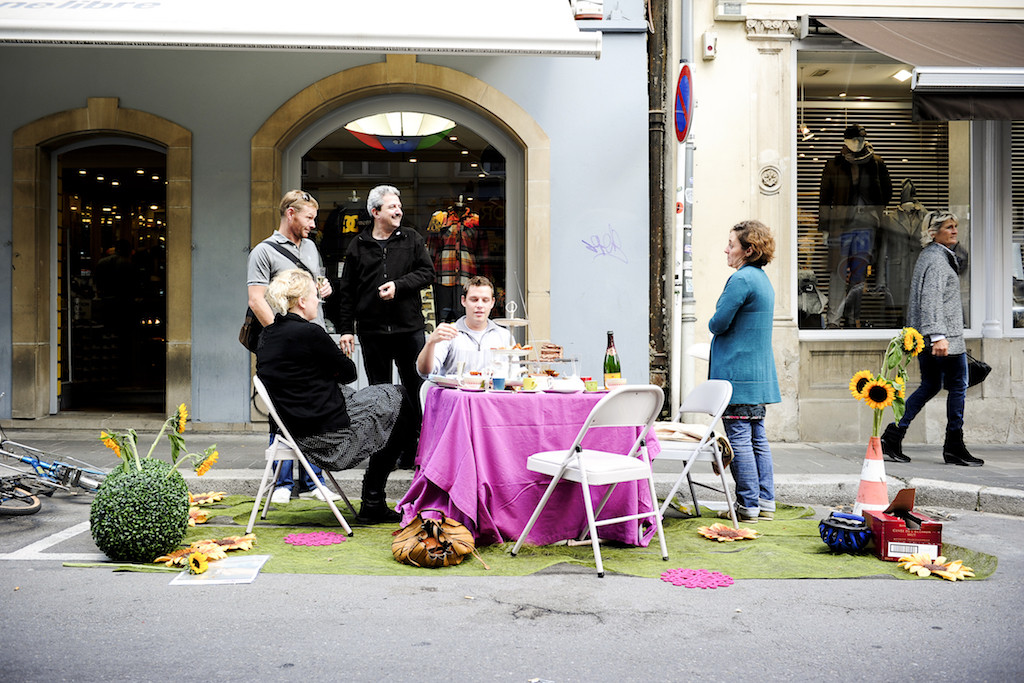It seems a straightforward offer: swap your resident’s parking permit for a bit of greenery in the freed-up space, a lawn, a sun terrace or somewhere for the children to play. However, if any further proof was needed of the west’s destructive love affair with the car, the furious reaction to a pilot project in one of the Netherlands’ biggest cities has been all too telling.
Streets have been divided, angry complaints made and Walter Dresscher, the organiser of the council-backed scheme in The Hague, given what he admits was a verbal going-over during a fiery public meeting. However, Dresscher’s determination remains undimmed: “We can’t go on like this. This has been a great success already because people are thinking.”
The drama was sparked by the Dutch municipality’s proposal to residents in six streets in Segbroek, a suburb in the west of the city, to voluntarily swap their parking permit for six months and replace it with something green and pleasant on their street.
Their vehicles would be stored in a car park for free, and those participating could choose between themselves how to use the vacant space.
The long-term aim, beyond greening the city, is to encourage people to use car-sharing schemes, if they really need a vehicle, or switch to public transport and bicycles. Globally, most cars are said to be parked 95% of the time .
Dresscher, an architect by training, said opposition from many residents in the selected areas illustrated how deeply people were attached to their cars, even in the Netherlands, which is often a pioneer in terms of green transportation. The idea of a parking space being lost from a street was too much for some to bear.
“I was a bit like a boxing guy, I took everything,” he said of the public meeting attended by 200 residents. “If I was to respond, like I would in a personal conversation, the meeting would not have finished very well ... Everybody took – and this in the Netherlands is more rare than in other countries – very opposite positions. Normally, we are a country where we have a dialogue, we talk to each other.
“The idea was to get people together but it didn’t. Why? If there is one that is very angry and starts mobilising the whole street then you have a problem.
“But if you don’t want to participate, don’t participate. But physically a car is getting out of the street. Nobody is losing anything.”
Dresscher insisted the initial hostility has abated but, as yet, only six householders have signed up to the scheme, with their cars due to be removed in June. Two residents have, however, pre-empted the scheme by putting flower-filled tow-carts in front of their homes, much to the irritation of some. Drivers have been known to shout abuse as they drive by.
Dresscher, who has €60,000 of funding from the council and charities, is still confident that more people will come round to his thinking, and is glad that a debate has been started.
Rembrant Frerichs, 40, and, Wolfert Brederode, 44, both pianists, and neighbours on Newtonstreet, said they believed it was an important first step in changing the nature of their road, but were yet to decide how to use the space in front of their homes.
Brederode said: “I just don’t think I need the car outside my house all the time and I’m going to see if we need it at all. I don’t think there is any reason.
“People have this belief that they have a right to have a car, a right to have a parking space. A car is like a second home to people but it isn’t rational.”
Dresscher said the project had been inspired by the experience of being forced to push his baby’s pram on the road when living in Amsterdam because cars were blocking the pavement.
“I looked at these cars and there were actually plants growing under them. They hadn’t moved for three or four weeks. I started thinking: does anyone know how many cars are used or not?”
Dresscher’s response from the Amsterdam municipality suggested that 25% of those cars used by residents were only driven once a week on average. Around 60% used their cars less due to fears that they would lose their parking place.
“This is a completely ridiculous situation,” he said. “I want to get rid of unused cars. The municipalities of Netherlands cannot keep going like this. One day they will come and take away that right, I am sure about that. But this is chance for people to change their behaviour themselves.”
A spokesman for The Hague municipality said: “People get the opportunity to choose themselves what they want to do with the public space. They can park their cars in the street or start sharing cars and fill up the free parking spots for other purposes like green, bicycle parking or picnic tables.
“We want to see the effect of this approach. Will this bottom-up approach work, where people get a direct effect of their choice to get rid of their car, or is it still necessary to make top-down policy to manage the amount of parked cars in public spaces? It’s a project that, when it succeeds, can easily be scaled up to other streets and neighbourhoods. We think that’s why this pilot is worth funding.”
Daniel Boffey in The Hague
